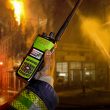NENA seeks proceeding for Cyren Call proposal
The National Emergency Number Association (NENA) yesterday asked Congress and the FCC to seek public comment on the Cyren Call Communications proposal to use 30 MHz of 700 MHz spectrum for a public-private network built to public-safety specifications.
Although NENA’s focus is on 911 systems, the organization did not hesitate to take a position on the spectrum issue, said Patrick Halley, NENA’s government affairs director.
“More and more, NENA is looking at 911 not as a standalone system but as part of bigger system,” Halley said. “We believe the 911 system of the future will let video from a robbery be sent to a PSAP or allow a picture to be sent from a wireless phone to a dispatcher. But all of that’s going to [require] a broadband connection.”
Headed by former Nextel Communications co-founder Morgan O’Brien, Cyren Call this spring proposed that half of the 60 MHz in the 700 MHz band scheduled to be auctioned by early 2008 instead be dedicated to public safety. A public-safety broadband trust would then lease the airwaves to commercial operators with the understanding that the operators would build and maintain a public-safety-grade wireless broadband network that could also be used to offer commercial services.
NENA officials believe the public-private partnership proposed by Cyren Call represents an efficient use of spectrum and provides a realistic economic model for the buildout and maintenance of a nationwide broadband network.
“NENA endorses the principles and goals of the Cyren Call proposal,” Halley said. “There are still some details that need to be worked out, which is why we need the proceeding.”
In its statement, NENA asked that the proceeding not impact the 24 MHz of 700 MHz spectrum already dedicated to public safety nor the funding for interoperability and PSAP upgrades earmarked from proceeds of the 700 MHz auction.
Although Cyren Call asked the FCC to open a proceeding to solicit public comment on its proposal, company officials have acknowledged that the commission needs direction from Congress to consider the notion of not auctioning the spectrum, which is expected to generate about $5 billion for the U.S. Treasury.
Earlier this month, O’Brien outlined a plan designed to ensure that Congress does not experience a revenue shortfall if the Cyren Call proposal becomes reality. Days later, the Association of Public-Safety Communications Officials (APCO) expressed support for such a public-private partnership, though it stopped short of endorsing the Cyren Call proposal.
Other public-safety organizations expressing support for a proceeding on the Cyren Call proposal include the Michigan and Illinois chapters of the International Association of Chiefs of Police (IACP). Harlin McEwen, chairman of the IACP’s Communications and Technology Committee, said the IACP’s national organization will be considering taking similar action next month.
“It’s not that we’re not interested, we just have a lot of people on vacation now,” he said.
Alan Caldwell, senior advisor for the International Association of Fire Chiefs (IAFC), said his organization has not taken a formal position on the Cyren Call proposal but is “actively engaged” in the issue.
“We are absolutely looking at that,” Caldwell said. “We’ve recognized the need for broadband capability. … We’re looking at any and all proposals.”

















